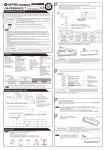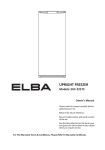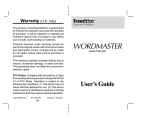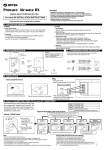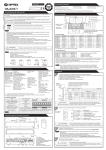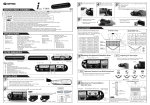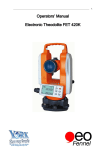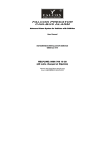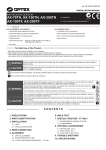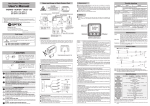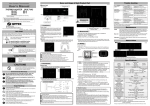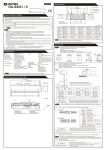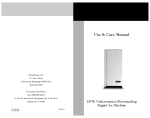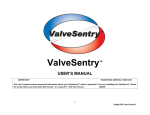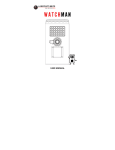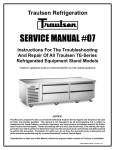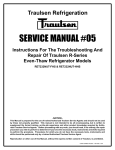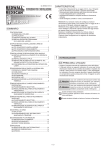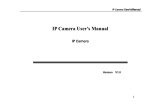Download X-Zone Manual
Transcript
OUTER DIMENSIONS AND PART NAMES 36(1 7/16") [mm (inch)] 7.5(5/16") 267(10 1/2") 125(4 15/16") 43(1 11/16") 38(1 1/2") 61(2 3/8") 5919220 MAR 2012 X-ZONE MANUFACTURER'S STATEMENT STATEMENT MANUFACTURER'S WARNING CAUTION NOTE (9) Disregard of the warning symbol can cause improper operation which may cause death or serious injury. (3) Disregard of the caution symbol can cause improper operation which may cause injury of a person or damage the object. (4) (5) BLUE-ZONE 1. This product is a non-contact switch intended for header mount or wall mount for use on an automatic sliding door. Do not use for any other applications. 2. When setting the sensor's detection area, make sure that there is no traffic around the installation site. 3. Before turning the power ON, check the wiring to prevent damage or malfunction of equipment connected to the product. 4. Only use the product as specified in the operation manual provided. 5. Be sure to install and adjust the sensor in accordance with the local laws and standards of the country in which the product is installed. 6. Before leaving the installation site make sure that the product is operating properly and instruct the building owner/operator on proper operation of the door and the product. 7.The product settings can only be changed by an installer or service engineer. When changed, the changed settings and the date shall be registered in the maintenance logbook accompanying the door. WARNING When dipswitch 15 is set to ON, the blue-zone area, that provides extra safety over the threshold, is activated. In case the blue-zone function is not required, set dipswitch 15 to OFF. Do not set the 2nd row overlapping the threshold regardless of the setting of dipswitch 15. 2nd row 1 The following conditions are not suitable for sensor installation. -Fog or exhaust emission around the door -Wet floor -Vibrating header or mounting surface -Moving objects, steel plate, emergency lights or illumination in the detection area or in vicinity -Highly reflecting floor or highly reflecting objects around the door -Grating floor H : Height from the floor to the bottom of the header Y : Distance between the bottom of the header and the sensor X : Distance between the door and the mounting surface Header Safety output : Form C relay 50V 0.3A Max.(Resistance load) Output hold time : <0.5 sec. Response time : <0.3 sec. Opetating temperature : -35 to +55°C (-31 to 131°F) Operating humidity : <80% IP rate : IP54 Weight : 320g (11.2oz ) Accessories : 1 Operation manual 2 Mounting screws 1 Mounting template 1 Area adjustment tool 1 Cable 3m (9'10") 1 Narrow lens Operation indicator table Status Operation indicator color Set-up Yellow blinking Stand-by (installation mode) Yellow Stand-by (operation mode) Green Blue-zone (1st row) detection*2 1sec. NOTE CAUTION 2 Orange Signal saturation Slow green blinking Sensor failure Fast green blinking 4 DETECTION AREA AIR Mounting height : 2.2m(7'2") Angle adjustment : +6° Sensitivity : M : Emitting spots A Mounting surface B Blue-zone(1st row) C 2nd row D : Detection area E F 3rd row G 1000(3′3") I 2000(6′6") 0 Microwave Mounting height : 2.2m(7'2") Vertical adjustment : +35° Sensitivity : H Speed of detection object : 50mm / sec. : Detection area (Wide area) : Detection area (Narrow area) H 1000 (3′3") : Emitting spots (can be eliminated) 1000 (3′3") AIR emitting area The chart shows the values at depth angle +6° [m(feet,inch)] 3.00 (9'10") 0.08 (3") 0.11 (4") 0.34 (1'1") 0.53 (1'9") 0.89 (2'11") 1.81 (5'11") 2.79 (9'2") 3.50 (11'6") 0.09 (4") 0.12 (5") 0.39 (1'4") 0.61 (2') 1.38 (3'5") 2.11 (5'11") 3.25 (10'8") 2.00 (6'6") 0.05(2") 0.07(3") 0.23 (9") 0.35 (1'2") 0.59 (1'11") 1.21 (3'12") 1.86 (6'1") 2.20 (7'2") 0.06 (2") 0.08 (3") 0.25 (10") 0.39 (1'3") 0.65 (2'2") 1.33 (4'4") 2.05 (6'9") 2.50 (8'2") 0.07 (3") 0.09 (4") 0.28 (11") 0.44 (1'5") 0.74 (2'5") 1.51(4'11") 2.32 (7'7") 2.70 (8'10") 0.074(3") 0.10 (4") 0.31 (1') 0.48(1'7") 0.80 (2'8") 1.63 (5'4") 2.51 (8'3") 2.52(8'3") 2.78 (9'1") 3.15 (10'4") 3.40 (11'2") 3.79 (12'5") 4.42 (14'6") The actual detection area may become smaller depending on the ambient light, the color / material of the object or the floor as well as the entry speed of the object. The sensor may not be activated when the entering speed of the object or a person is slower than 50mm / sec. or faster than 1500mm / sec. 0.13 (5") 0.12 (5") 0.10 (4”) 0.09 (4”) - 2.80 (9' 2") No limit 0.13 (5") 0.12 (5") 0.11 (4") 0.10 (4”) 0.09 (4") - 3.00 (9'10") 3.50 (11'6") 0.14 (6") 0.12 (5") 0.11 (4") 0.10 (4”) 0.09 (4”) - 0.14 (6") 0.12 (5") 0.11 (4") 0.10 (4") 0.09 (4") - 0 0 0 0 0 - Make sure not to mount the sensor lower than the bottom of header. 1 1.Grey 2.Grey 3.White 4.Yellow 5.Green Safety output 6.White stripe 7.Yellow stripe 8.Green stripe WARNING 3 } 12 to 24VAC 10% 12 to 30VDC 10% Common (COM.) Normally open (N.O.) Normally closed (N.C.) Common (COM.) Normally open (N.O.) Normally closed (N.C.) Before starting the procedure, make sure that the power is turned OFF. When passing the cable through the hole, do not tear the shield otherwise it may cause electric shock or breakdown of the sensor. 3 1.Plug the connector. 2.Supply power to the sensor. Adjust the detection area and set the dipswitches. (See ADJUSTMENTS 4. Dipswitch settings) NOTE Make sure to connect the cable correctly to the door controller before turning the power ON. When turning the power ON or after adjusting the settings, do not enter the detection area for more than 10 seconds in order to enable the presence detection. 4 Place the housing cover. If wiring is to be exposed, break the knockout. WARNING Danger of electric shock 2000 (6′6") - 2.50 (8' 2") Activation output 2 Danger of electric shock [mm(feet,inch)] 0.13 (5") 0.11 (4") 0.10 (4”) - [m (feet,inch)] 2.30 (7' 6") Wire the cable to the door controller as shown below. Power supply The specifications herein are subject to change without prior notice due to improvements. 2.00 (6' 6") Make sure to affix the mounting template as described in the above chart, otherwise it can be dangerous since there may be no detection area around the threshold. Install the sensor as low as possible on the header. Risk of getting caught 1sec. *1 : Active infrared reflection has a presence detection function. *2 : See BLUE-ZONE I Floor 0 0.05 (2") 0.10 (4") 0.15 (6") 0.20 (8") 0.25 (10") 0.30 (12") Red 3rd row detection NOTE H Door Blue Microwave detection 2000 (6′6") H X X Red blinking 2nd row detection A B C D E F G H Maximum distance (Y) Y : X-ZONE : Black : 2.0 (6'6") to 3.5m (11'6") : See DETECTION AREA : Active infrared reflection*1 Microwave doppler effect Depth angle : AIR area -6 to +6° adjustment Microwave area +25 to +45° Power supply : 12 to 24VAC ±10% (50 / 60 Hz) 12 to 30VDC ±10% Power consumption : < 2.5W (< 4VA at AC) Operation indicator : See Operation indicator table Activation output : Form C relay 50V 0.3A Max.(Resistance load) Blue-zone (1st row) 2nd row 3rd row 1. Affix the mounting template at the desired mounting position. Refer to the chart in below. 2. Drill two mounting holes of ø3.4mm (ø1/8”). 3. To pass the cable through the header, drill a wiring hole of ø8mm (ø5/16”). 4. Remove the mounting template. 5. Remove the housing cover. Fix the sensor to the mounting surface with the two mounting screws. Sensor SPECIFICATIONS Model Cover color Mounting height Detection area Detection method Blue-zone (1st row) 3rd row INSTALLATION Do not wash, disassemble, rebuild or repair the sensor, otherwise it may cause electric shock or breakdown of the equipment. Danger of electric shock NOTE (8) (7) (6) Special attention is required to the section of this symbol. NOTE NOTE (2) (1) Read this operation manual carefully before use to ensure proper operation of this product. Failure to read this operation manual may cause improper operation and may result in serious injury or death of a person.The meanings of the symbols are as follows. (1) Connector (2) Mounting holes (3) Operation indicator (4) Width adjustment screws (5) Depth angle adjustment screw (6) Microwave sensitivity potentiometer (7) Dipswitches (8) Detection window (9) Area adjustment tool Knockout Do not use the sensor without the cover. When using the cable knockout, install the sensor indoors or use the rain cover (separately available) otherwise electric shock or breakdown of the sensor may occur. Table 2 ADJUSTMENTS 1 Area depth angle adjustment Area adjustment tool Depth angle adjustment screw 9 A B 9 Make sure that the detection area does not overlap with the door / header, and there is no highly reflecting object near the detection area otherwise ghosting / signal saturation may occur. 1-2 Microwave adjustment 1-1 AIR adjustment Depth angle adjustment screw for the AIR area Shallow Shallow Deep Use the area adjustment tool (B) as shown above to change the area depth angle. [mm(feet,inch)] 0 0 2000 (6′6") 2000 (6′6") 3000 (9′10") 3000 (9′10") 2000 (6′6") 2 0 1000 (3′3") 2000 (6′6") 1000 (3′3") 0 Area width adjustment 2-2 Microwave adjustment To adjust the microwave detection area width, use the narrow lens as shown in the picture below, referring to the following procedures. For detection area, See DETECTION AREA in the front page. Narrow lens To adjust the AIR detection area width, use the adjustment screws as shown in the picture below. 1 2 3 10 11 12 Eliminated Narrow 2.Open Wide 1.Remove screw Width adjustment screws NOTE 12 Microwave sensitivity Top view L 1 3000 (9′10") 2 3 4 5 6 7 8 H 0 1000 (3′3") 1000 (3′3") 2000 (6′6") 3000 (9′10") 4 [mm(feet,inch)] 2000 (6′6") 1000 (3′3") 0 1000 (3′3") L 2000 (6′6") H 2000 (6′6") H 3000 (9′10") 0 Power OFF Outside of detection area Entry into microwave area Status - Stand-by Motion detection active Operation indicator None Green Orange Safety Safety output 13 Activation output Safety & Activation Safety output 1000 (3′3") Dipswitch 1 Dipswitch 2 Dipswitch 3 Dipswitch 4 Low Sensitivity Presence timer Dipswitch 5 Dipswitch 6 Frequency Dipswitch 7 Rain mode Dipswitch 8 Dipswitch 9 Dipswitch 10 Auto caution Dipswitch 11 Immunity Dipswitch 12 For future use Dipswitch 13 AIR output Dipswitch 14 For future use Dipswitch 15 Blue-zone Dipswitch Installation mode 16 S-High 30sec 60sec 180sec 600sec 34 34 34 34 Setting1 Setting2 Setting3 Setting4 56 56 56 Normal 7 Direction High Normal Rain 7 Snow 8 8 Bi Uni 9 9 OFF ON 10 10 OFF ON 11 11 Safety Safety + Activation 13 13 OFF ON 15 15 OFF ON 16 16 Motion/Presence detection active Red Red Blinking Blue 1. When turning the power ON, always walk-test the detection area to ensure the proper operation. 2. Do not place any objects that move or emit light in the detection area. (e.g. plant, illumination, etc.) Door does not open when a person enters the detection area. Operation indicator None Unstable Proper Door opens when no one is in the detection area. (ghosting) Comment 12 12 12 12 2.0 to 3.0m 2.0 to 3.0m 2.5 to 3.2m 3.0 to 3.5m 56 Snow mode Middle Entry into blue-zone (1st row) WARNING Unstable Proper Other settings Setting Entry into 2nd row Entry into 3rd row : COM. : N.O. : N.C. 1. Always keep the detection window clean. If dirty, wipe the window with a damp cloth. Do not use any cleaner / solvent. 2. Do not wash the sensor with water. 3. Do not disassemble, rebuild or repair the sensor yourself, otherwise an electric shock may occur. 4. When the operation indicator blinks green, contact your installer or service engineer. 5. Always contact your installer or service engineer when changing the settings. 6. Do not paint the detection window. Door remains open Microwave settings ④White Str. ⑤Yellow Str. ⑥Green Str. INFORM BUILDING OWNER / OPERATOR OF THE FOLLOWING ITEMS 2000 3000 (6′6") (9′10") Table1 Function : COM. : N.O. : N.C. Activation output Dipswitch settings AIR settings 10 Entry Mounting height : 2.2m (7'2") Vertical adjustment : +35° Wide area Narrow area L 9 10 11 12 9 : Non-Detection TROUBLESHOOTING Adjust the microwave detection area with potentiometer. Turning it clockwise increases the sensitivity and turning counterclockwise lowers the sensitivity. 2000 (6′6") Uni ON Uni-direction with Auto caution mode Check the operation in the operation mode according to the chart below. ①White ②Yellow ③Green Door operation 3 [mm(feet,inch)] Front view 0 2.Open : Detection 10 CHECKING NOTE When setting the detection area width, make sure to turn the adjustment screws until it clicks. 1 2 3 cannot be eliminated separately, neither can 10 11 9 Bi-direction When Dipswitch 9 is set to Bi, Bi-direction mode is effective, regardless of Dipswitch 10 setting. 13 2-1 AIR adjustment Eliminated Sensor Deep Shallow Deep Shallow Uni-direction(Uni) Uni OFF Detection area 10 Blue Use the area adjustment tool (A) as shown above to change the area depth angle. [mm(feet,inch)] Deep Depth angle adjustment screw for the microwave area Red 10 Bi ON When adjusting the 2nd row close to the door, follow Table1 dipswitch16 for the easier adjustment. NOTE Bi-direction(Bi) Door Bi OFF Set the sensitivity according to the mounting height. Values below dipswitch are reference only. All rows have the presence detection function. The presence detection timer can be selected from 4 settings. Proper operation Set this switch to Rain if the sensor is used in a region with a lot of rain. Set this switch to Snow if the sensor is used in a region with snow or a lot of insects. When dipswitch 9 is set to uni-directional, this setting enables the door to close earlier when a person walks away from *Please refer to the door. Table 2 for the When dipswitch 10 is set to ON, a person details. wavering in the activation detection area can be detected. This is only effective when dipswitch 9 is set to uni-directional. Set dipswitch 11 to ON when the sensor operates by itself (ghosting). When dipswitch 11 is set to ON the actual detection area may occur smaller. When dipswitch 13 is ON, the sensor outputs safety and activation simultaneously. When dipswitch 15 is set to ON, the blue -zone (1st row) is active and looks through the threshold. Set dipswitch 16 to ON to adjust the 2nd row. After setting the row switch dipswitch 16 OFF. During the installation mode only the 2nd row remains active and the operation indicator shows yellow. Wrong power supply voltage. Wrong wiring or connection failure. Wrong detection area positioning. Sensitivity is too low. Short presence detection timer. Dirty detection window. Set to the stated voltage. Check the wires and connector. Check ADJUSTMENTS 1, 2 ,3 & 4. Wrong wiring or connection failure. Check the wires and connector. Objects that move or emit light in the detection area. Remove the objects. The detection area overlaps with another sensor. Check Table1 dipswitch 5, 6. Waterdrops on the detection window. Detection area overlaps with door / header. Wipe the detection window with a damp cloth. Use the rain-cover (Separately available). Adjust the detection area (AIR or MW) to "deep". Or set dipswitch 11 to ON. Sensitivity is too high. Set the sensitivity lower. Raining or snowing(AIR) Raining or snowing(Microwave) Others Set dipswitch 7 and / or dipswitch 8 to ON. Set dipswitch 9 and / or dipswitch 11 to ON. Set dipswitch 11 to ON. Check Table1 dipswitch 1 to 4. If the problem still persists, hard-reset the sensor.(Turn the power OFF and ON again) Sudden change in the detection area Set the sensitivity higher. Set the presence timer longer. Wipe the detection window with a damp cloth. Do not use any cleaner or solvent. Wrong wiring or connection failure. Check the wiring. Yellow Fast green blinking Installation mode is set to ON. Set dipswitch 16 to OFF. Sensor failure Contact your installer or service engineer. Fast green blinking Sensitivity is too low. Slow green blinking Slow green blinking When using more than two sensors close to each other, set the frequency different for each sensor. Possible countermeasures Possible cause Dirty detection window Set the sensitivity higher. Set AIR area width to "wide". Wipe the detection window with a damp cloth. Do not use any cleaner or solvent. The detection area overlaps with the door / header. Adjust the detection area to "deep". Signal saturation (AIR) Remove highly reflecting objects from the detection area or lower the sensitivity or change the area depth angle for AIR area. FCC WARNING(For USA) Changes or modifications not expressly approved by the party responsible for compliance could void the user's authority to operate the equipment. -NOTICEThis equipment has been tested and found to comply with the limits for a Class B digital device, pursuant to part 15 of the FCC Rules. These limits are designed to provide reasonable protection against harmful interference in a residential installation.This equipment generates, uses and can radiate radio frequency energy and, if not installed and used in accordance with the instructions, may cause harmful interference to radio communications. However, there is no guarantee that interference will not occur in a particular installation. If this equipment does cause harmful interference to radio or television reception, which can be determined by turning the equipment off and on, the user is encouraged to try to correct the interference by one or more of the following measures: -Reorient or relocate the receiving antenna -Increase the separation between the equipment and receiver. -Connect the equipment into an outlet on a circuit different from that to which the receiver is connected. -Consult the dealer or an experienced radio/TV technician for help. -NOTICE1.The antennas cannot be exchanged. 2.To comply with FCC RF exposure compliance requirements, aseparation distance of at least 20cm must be maintained between the antenna of this device and all persons. IC(For CANADA) Operation is subject to the following two conditions: (1) this device may not cause interference, and (2) this device must accept any interference received, indluding interference that may cause undesired operation of the device. Manufacturer North and South America Subsidiary 5-8-12 Ogoto Otsu 520-0101, Japan TEL.: +81(0)77-579-8700 FAX.: +81(0)77-579-7030 WEBSITE: www.optex.co.jp/as/eng/index.html 3882 Del Amo Blvd., Suite 604 Torrance, CA 90503 U.S.A. TEL.: +1-800-877-6656 FAX.: +1(310)214-8655 WEBSITE: www.optextechnologies.com OPTEX Co.,LTD. OPTEX Technologies Inc. Corporate Headquarters East coast office 8510 McAlpines Park Drive, Suite 108 Charlotte, NC 28211 U.S.A. TEL.: +1-800-877-6656 FAX.: +1(704)365-0818 WEBSITE: www.optextechnologies.com


